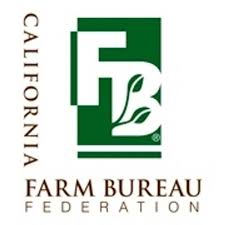 approved last week, is expected to garner Senate passage and President Trump's signature.
approved last week, is expected to garner Senate passage and President Trump's signature.California Farm Bureau Federation President Jamie Johansson called the congressional action to help secure added funding for water infrastructure "critical," especially as California faces new state groundwater management requirements and the possibility of reduced flows in certain rivers and streams.
The House legislation, known as America's Water Infrastructure Act of 2018 or AWIA, contains language by Rep. Jeff Denham, R-Turlock, that would provide a new tool for financing and building Central Valley water infrastructure.
"Under this bill," Denham said, "the new water act will set up a bank of financing for these water-storage projects and we can finally get some of these big reservoirs underway—raising Shasta, building Sites Reservoir, expanding Los Vaqueros, building Temperance Flat."
CFBF federal policy consultant Erin Huston said the water infrastructure legislation authorizes financing of new water-storage projects as part of the Water Resources Development Act, the primary federal legislation for water resources around the country that is reauthorized every two years. The AWIA legislative package incorporates both WRDA and a Safe Drinking Water Act reform bill in the House.
"It is a bipartisan compromise and includes basic provisions from those three pieces of legislation," Huston said. "The Senate is expected to vote on what the House passed without any amendments and it will go to the president for his signature."
Northern California Water Association President David Guy called the legislation "an important step forward to help with infrastructure projects, including Sites Reservoir."
Sites, an offstream reservoir planned for Glenn and Colusa counties, is among the water-storage projects approved for funding from the Proposition 1 state water bond. It would create a basin for 1.8 million acre-feet of water.
"This bill, by providing the federally backed financing, will help reduce the cost significantly to the agencies and ultimately to farmers to help with the project," Guy said. "It truly is a loan and will be paid back in its entirety, but by having the federal government back the financing, (project supporters) get much better rates for the debt service."
The savings to public agencies are estimated to be between 20 and 25 percent in the debt service, Guy said, adding, "for a multi-billion-dollar project, it's going to be a significant savings to help folks build projects."
The AWIA also includes provisions that will support local irrigation districts and water agencies in their efforts to raise spillway gates, build new water-storage facilities, and repair and expand dams, reservoirs and other water projects. In addition, Huston said, the Denham language included in the bill would improve flood protection for San Joaquin Valley residents.
Specifically, the AWIA includes legislation introduced by Rep. Jim Costa, D-Fresno, that will enable the Merced Irrigation District to take the first steps forward with a project to raise the spillway gates at New Exchequer Dam. This would enlarge the storage capacity of Lake McClure, increasing water supplies for eastern Merced County up to 57,000 acre-feet.
"This legislation creates a pathway for the first new surface-water storage in the valley in decades," Costa said.
The bill also extends funding for a program to restore the seismic stability and eventual expansion of San Luis Reservoir, and it creates a pilot program in the Russian River Basin to develop a system for incorporating weather forecasts into reservoir operations.
Also last week, the U.S. Senate passed an energy and water development appropriations bill that includes several provisions affecting water in California and the West:
- An additional $196 million to fund California and Western drought programs under the Water Infrastructure Improvements for the Nation Act of 2016, including $134 million for water storage, $20 million for water recycling, $12 million for desalination and $30 million for environmental and science projects.
- $540 million for U.S. Army Corps of Engineers and Bureau of Reclamation water infrastructure programs specifically in California.
- $34 million for WaterSMART grants and almost $59 million for the Title XVI Water Reclamation and Reuse program.
- $35 million for the San Joaquin River Restoration project.
- $8 million, a 45 percent increase from last year, for improved research, monitoring and forecasting of atmospheric-river storms, which contribute an increasingly large share of California's annual rainfall.
- Increased funding for desalination research and development by almost 35 percent.
- A requirement for an independent risk analysis of Oroville Dam and an extensive review of all federal dam safety practices.
Sen. Dianne Feinstein, D-Calif., said increased funding in the appropriations bill "will allow the federal government to match our state's efforts through Proposition 1 to finally build new projects to store more water from the wet years for the dry years."
(Christine Souza is an assistant editor of Ag Alert. She may be contacted at csouza@cfbf.com.)
Reprinted with permission: California Farm Bureau Federation









